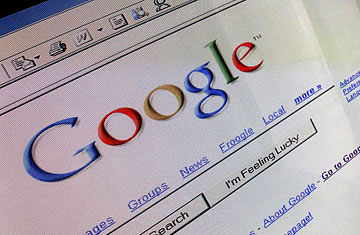
Google has so transcended its function as a search engine that it is now an all-purpose verb to describe any hunt for information on the Internet. But with European Union regulators announcing an investigation into Google's business practices on Tuesday, the California-based tech giant is probably hoping this is one search that delivers no results.
Although Google can boast extraordinary success since its founding 12 years ago, the European Commission — the E.U. antitrust watchdog — could represent its most serious challenge yet. If the Commission finds the world's favorite search engine guilty of abusing its dominant position, Google could face a fine of up to 10% of its annual revenue, which would total a massive $2.4 billion based on 2009 figures.
In its statement, the Commission said it would "conduct an in-depth investigation of the case as a matter of priority," noting that it does not yet have "proof of infringements." Google denies the allegations, but says it will work with the Commission to "address any concerns."
The Commission launched its probe after three rivals — British price-comparison site Foundem, French legal search engine Ejustice.fr, and the shopping site Ciao — accused Google of manipulating its searches by deliberately demoting their sites to the lower echelons of results. The investigation will look into their claims that Google's algorithms give preferential placement to its own vertical search or price-comparison services at the expense of competitors. It will also probe allegations about the exclusivity obligations Google places on its advertising partners, preventing them from running certain types of competing ads on other sites.
Foundem says Google is exploiting its dominance of search in ways that stifle innovation, suppress competition, and erode consumer choice. It claims that Google's Universal Search system — which mixes in listings from its news, video, images, local and book search engines among those it gets from the rest of the web — is transforming Google's ostensibly neutral search results into a powerful marketing tool for itself, brazenly placing its own services in the top slots for most product- and price-comparison-related searches. "When a site is penalized, that means you are completely excluded from search results," says Adam Raff, Foundem's chief technology officer and co-founder. "Search plays a unique role in steering traffic and revenues through the global digital economy. It means that Google is not just a monopoly, it is probably the most powerful monopoly in history."
Google argues that there are "compelling reasons" why these sites are "ranked poorly". It says Foundem "duplicates 79% of its website content from other sites", and that people searching for hotels in Milan want to be taken directly to sites in Milan, not to a price-comparison site. "A search engine's job is to point you to destination sites that have the information you are seeking, not to send you to other search engines," says expert Danny Sullivan, editor-in-chief of the Orange County-based Search Engine Land.
Google officials also say they sense Microsoft's hand in the complaints. Microsoft bought into the German firm Ciao, while Foundem belongs to the Microsoft-bankrolled Initiative for a Competitive Online Marketplace (ICOMP) — although Foundem insists its problems with Google long predate its ICOMP membership.
Google handles 80% of European searches, according to research firm ComScore, compared to 65% of searches done in the U.S. Google has also expanded into Europe in a more conventional business sense: it has a headquarters in Dublin; large facilities in Zurich, London and Belgium; and smaller centers in Denmark, Russia and Poland.
But Google's influence is meeting increasing resistance in Europe. Authors have been battling plans by the site to digitize the contents of millions of books; newspapers have attacked the free use of their content on Google News; in Italy, prosecutors are accusing Google's YouTube video website of invasion of privacy; and many German towns have blocked Google from taking pictures of storefronts and homes for its Street View service. In May, the E.U.'s data protection authorities said that Google — along with Yahoo and Microsoft — was breaching European law by failing to make users' data anonymous.
But Google is likely to be most concerned about the Commission, whose antitrust regulators tend to take a far more activist approach to competition policy than their U.S. counterparts. Last year, the Commission fined chipmaker Intel a record $1.45 billion for skewing the market by paying PC makers and retailers not to use rival chips. Two years ago, under Commission pressure, Apple scrapped its policy of charging British consumers more than other Europeans for songs from iTunes service. Most memorably, the E.U. and Microsoft clashed over the company's practice of bundling other software such as media players into Windows — by the time they ended their decade-long legal battle last year, the E.U. had fined the world's top software-maker $2 billion.
Once considered a cool, smart company that reflected the best of the new Internet economy, Google has taken on a slightly more sinister aura as it has grown. Now Europeans are increasingly agreeing with German Justice Minister Sabine Leutheusser-Schnarrenberger, who complained recently about Google's "megalomania." Google says its success and the disruptive nature of its business make suspicion inevitable. But with the Commission now probing its practices, Google will have to hope that its famous algorithms show it is living up to its unofficial slogan: Don't be evil.
